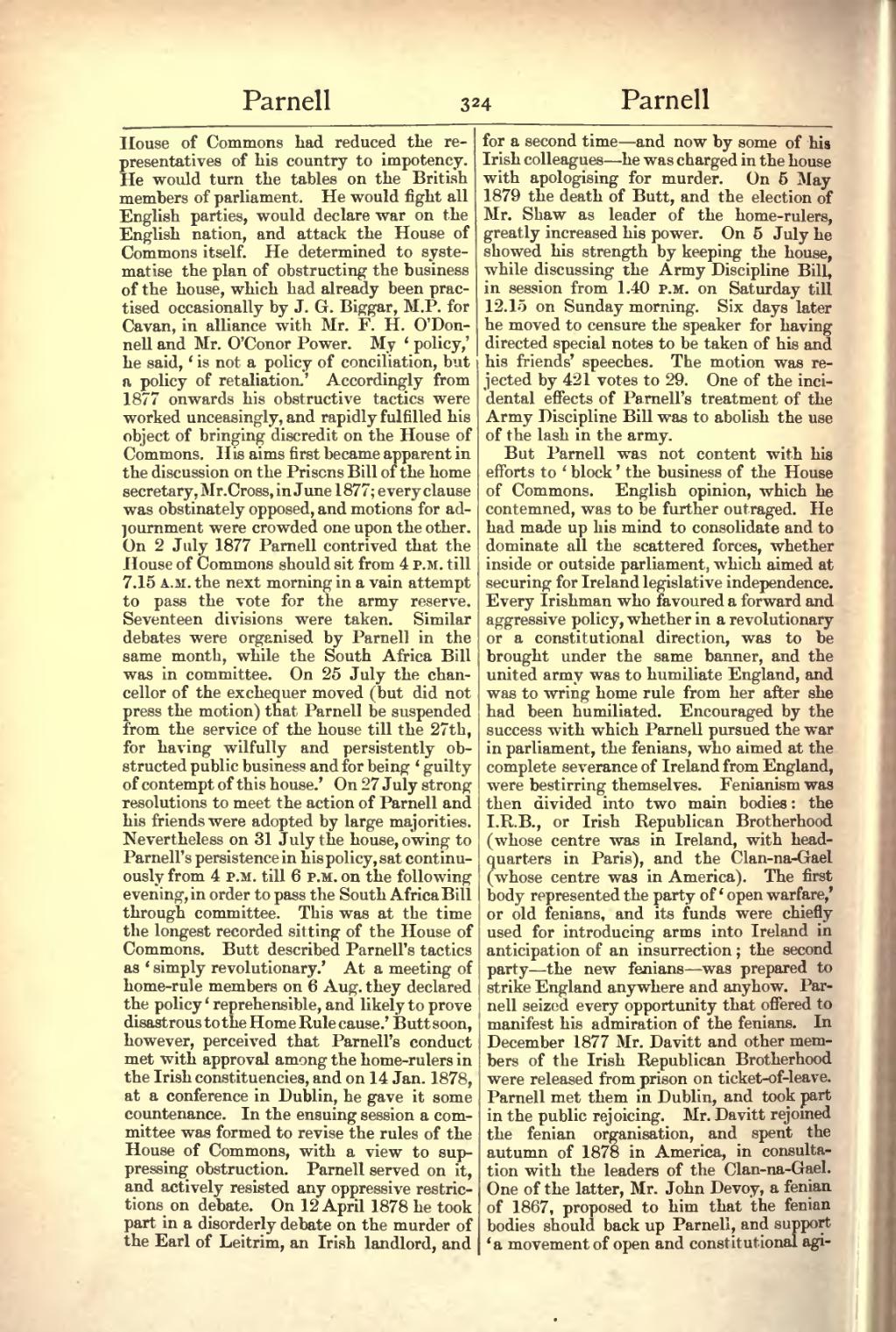House of Commons had reduced the representatives of his country to impotency. He would turn the tables on the British members of parliament. He would fight all English parties, would declare war on the English nation, and attack the House of Commons itself. He determined to systematise the plan of obstructing the business of the house, which had already been practised occasionally by J. G. Biggar, M.P. for Cavan, in alliance with Mr. F. H. O'Donnell and Mr. O'Conor Power. My 'policy,' he said, 'is not a policy of conciliation, but a policy of retaliation.' Accordingly from 1877 onwards his obstructive tactics were worked unceasingly, and rapidly fulfilled his object of bringing discredit on the House of Commons. His aims first became apparent in the discussion on the Prisons Bill of the home secretary, Mr. Cross, in June 1877; every clause was obstinately opposed, and motions for adjournment were crowded one upon the other. On 2 July 1877 Parnell contrived that the House of Commons should sit from 4 P.M. till 7.15 A.M. the next morning in a vain attempt to pass the vote for the army reserve. Seventeen divisions were taken. Similar debates were organised by Parnell in the same month, while the South Africa Bill was in committee. On 25 July the chancellor of the exchequer moved (but did not press the motion) that Parnell be suspended from the service of the house till the 27th, for having wilfully and persistently obstructed public business and for being 'guilty of contempt of this house.' On 27 July strong resolutions to meet the action of Parnell and his friends were adopted by large majorities. Nevertheless on 31 July the house, owing to Parnell's persistence in his policy, sat continuously from 4 P.M. till 6 P.M. on the following evening, in order to pass the South Africa Bill through committee. This was at the time the longest recorded sitting of the House of Commons. Butt described Parnell's tactics as 'simply revolutionary.' At a meeting of home-rule members on 6 Aug. they declared the policy 'reprehensible, and likely to prove disastrous to the Home Rule cause.' Butt soon, however, perceived that Parnell's conduct met with approval among the home-rulers in the Irish constituencies, and on 14 Jan. 1878, at a conference in Dublin, he gave it some countenance. In the ensuing session a committee was formed to revise the rules of the House of Commons, with a view to suppressing obstruction. Parnell served on it, and actively resisted any oppressive restrictions on debate. On 12 April 1878 he took part in a disorderly debate on the murder of the Earl of Leitrim, an Irish landlord, and for a second time—and now by some of his Irish colleagues—he was charged in the house with apologising for murder. On 5 May 1879 the death of Butt, and the election of Mr. Shaw as leader of the home-rulers, greatly increased his power. On 5 July he showed his strength by keeping the house, while discussing the Army Discipline Bill, in session from 1.40 P.M. on Saturday till 12.15 on Sunday morning. Six days later he moved to censure the speaker for having directed special notes to be taken of his and his friends' speeches. The motion was rejected by 421 votes to 29. One of the incidental effects of Parnell's treatment of the Army Discipline Bill was to abolish the use of the lash in the army.
But Parnell was not content with his efforts to 'block' the business of the House of Commons. English opinion, which he contemned, was to be further outraged. He had made up his mind to consolidate and to dominate all the scattered forces, whether inside or outside parliament, which aimed at securing for Ireland legislative independence. Every Irishman who favoured a forward and aggressive policy, whether in a revolutionary or a constitutional direction, was to be brought under the same banner, and the united army was to humiliate England, and was to wring home rule from her after she had been humiliated. Encouraged by the success with which Parnell pursued the war in parliament, the fenians, who aimed at the complete severance of Ireland from England, were bestirring themselves. Fenianism was then divided into two main bodies: the I.R.B., or Irish Republican Brotherhood (whose centre was in Ireland, with headquarters in Paris), and the Clan-na-Gael (whose centre was in America). The first body represented the party of 'open warfare,' or old fenians, and its funds were chiefly used for introducing arms into Ireland in anticipation of an insurrection; the second party the new fenians was prepared to strike England anywhere and anyhow. Parnell seized every opportunity that offered to manifest his admiration of the fenians. In December 1877 Mr. Davitt and other members of the Irish Republican Brotherhood were released from prison on ticket-of-leave. Parnell met them in Dublin, and took part in the public rejoicing. Mr. Davitt rejoined the fenian organisation, and spent the autumn of 1878 in America, in consultation with the leaders of the Clan-na-Gael. One of the latter, Mr. John Devoy, a fenian of 1867, proposed to him that the fenian bodies should back up Parnell, and support 'a. movement of open and constitutional agi-
